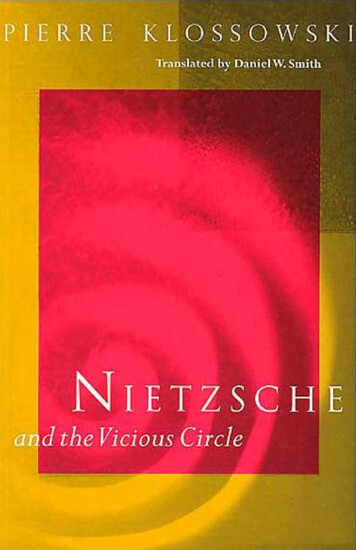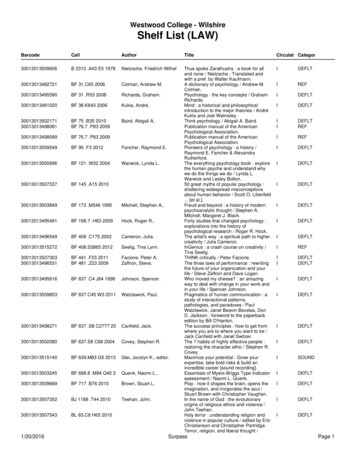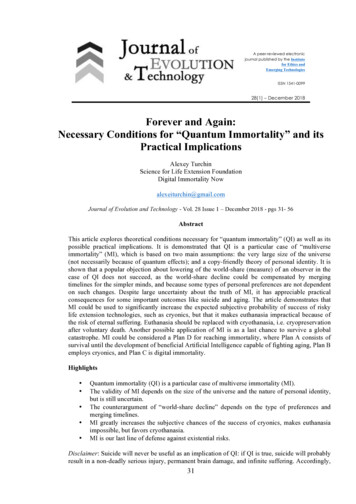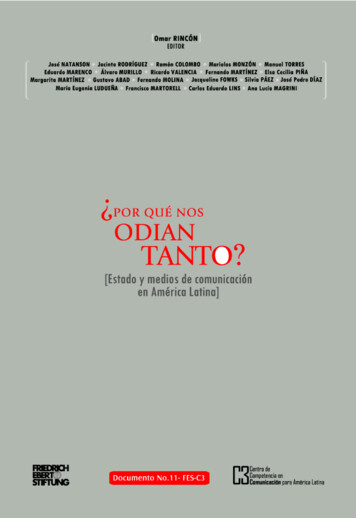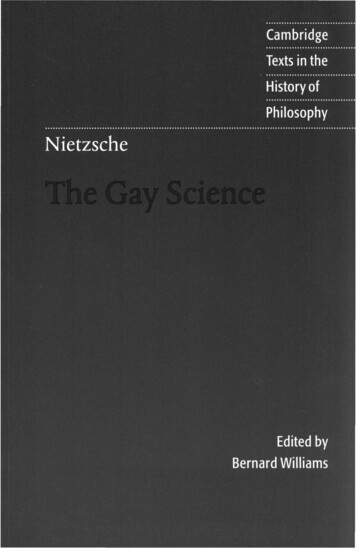
Transcription
This free e-book has been downloaded from -science-friedrich-nietzsche/CAMBRIDGE TEXTS IN THEHISTORY OF PHILOSOPHYFRIEDRICH NIETZSCHEThe Cay Science
CAMBRIDGE TEXTS IN THEHISTORY OF PHILOSOPHYSeries editorKARL AMERIKSProfessor ofPhilosophy at the University ofNo tre DameDESMOND M. CLARKEProfessor ofPhilosophy at University College CorkThe main objective of Cambridge Texts in the History of Philosophy isto expand the range, variety and quality of texts in the history ofphilosophy which are available in English. The series includes texts byfamiliar names (such as Descartes and Kant) and also by less wellknown authors. Wherever possible, texts are published in complete andunabridged form, and translations are specially commissioned for theseries. Each volume contains a critical introduction together with aguide to further reading and any necessary glossaries and textualapparatus. The volumes are designed for student use at undergraduateand postgraduate level and will be of interest not only to students ofphilosophy, but also to a wider audience of readers in the history ofscience, the history of theology and the his tory of ideas.Fora list oftitles publis hed in the series, please see end ofbook.
FRIEDRICH NIETZSCHEThe Cay ScienceWith a Prelude in German Rhymesand an Appendix ofSongsEDITED BYBERNARD WILLIAMSAll Souls College, OxfordTRANSLA TED BYJOSEFINE NAUCKHOFFWake Forest UniversityPOEMS TRANSLATED BYADRIAN DEL CAROUniversity o/Colorado at Boulder. . . . . CAMBRIDGE:::UNIVERSITY PRESS
CAMBRIDGE UNIVERSITY PRESSCambridge, New York, Melbourne, Madrid, Cape Town, Singapore, Sao Paulo, DelhiCambridge University PressThe Edinburgh Building, Cambridge c B2 8R u, UKPublished in the United States of America by Cambridge University Press, New Yorkwww.cambridge.orgInformation on this tide: www.cambridge.org/9780521636452 Cambridge University Press 2001This publication is in copyright. Subject to statutory exceptionand to the provisions of relevant collective licensing agreements,no reproduction of any part may take place withoutthe written permission of Cambridge University Press.First published 2001Seventh printing 2008Printed in the United Kingdom at the University Press, CambridgeA catalogue record for this publication is available from the British LibraryLibrary ofCongress cataloguing in publication dataNietzsche, Friedrich Wilhelm, 1844-1900.[Friihliche Wissenschaft. English]The gay science: with a prelude in German rhymes and an appendix of songs I Friedrich Nietzsche;edited by Bernard Williams; translated by Josefine Nauckhoff; poems translated by Adrian Del Caro.p. cm. - (Cambridge texts in the history of philosophy)lncludes bibliographical references (p. ) and index.ISBN o 521 631599(hardback)-ISBN o 52163645o(paperback)r. Philosophy. I. Williams, Bernard Arthur Owen.11. Nauckhoff,Josefine.III. Del Caro, Adrian, 1952- . IV. Tide.v. Series.B3313.F72 ES 2001193-dc21 2001025408ISBN 978-0-521-63 I 59-4 hardbackISBN 978-0-521-63645-2 paperbackCambridge University Press has no responsibility for the persistence or accuracy ofURLsfor external or third-party internet websites referred to in this publication, and does notguarantee that any content on such websites is, or will remain,accurate or appropriate.
Contentspage viilntroductionChronologyXXlllFurther readingXXVlNote on the textXXVllThe Gay ScienceI'Joke, Cunning and Revenge': Prelude in German RhymesIIBookOne27BookTwo69Book Three109Book Four: StJanuarius157Book Five: We Fearless Ones199Appendix: Songs of Prince Vogelfrei249IndexV
IntroductionThe Cay Science is a remarkable book, both in itself and as offering away into same of Nietzsche's most important ideas. The history of itspublication is rather complex, and it throws same light on the development of his thought and of his methods as a writer. He published thefirst edition of it in 1882. In that version, it consisted of only four books,and had no Preface, though it did have the 'Prelude in Rhymes'. Asecond edition appeared in 1887, which added a fifth book, the Preface,and an Appendix of further poems. This is the work as we now know it,and which is translated here.Between the two editions of The Cay Science, Nietzsche wrote two ofhis best-known works, Thus Spoke Zarathustra (1883-5) and BeyondCood and Evi/ (1886); the last section of Book Four of The Cay Science(342) 1 is indeed virtually the same as the first section of Zarathustra. Sothe complete Cay Science brackets these two books, which are differentfrom it and from each other. (Zarathustra, which is a peculiar literaryexperiment in a rhetoric drawn from the Bible, was once ane ofNietzsche's most popular works, but it has worn less well than theothers.) Book Five of The Cay Science anticipates, in turn, same of thethemes of another famous book which was to follow in 1887, On theCenealogy of Morality, which is again different in tone, sustaining amore continuous theoretical argument.The Cay Science is a prime example of what is aften called Nietzsche's'aphoristic' style. It consists of a sequence of sections which are notobviously tied to ane another except, sametimes, in general content, and1References to The Cay Science, and to other works by Nietzsche, are to numbered sections.Vll
lntroductionwhich do not offer a connected argument. The second half of BookThree, in particular, consists of many very short paragraphs of thiskind. Elsewhere, however, there are longer passages, and in faet thearrangement of the shorter sections is not as fortuitous as it may look. Itis often designed to gather thoughts which will, so to speak, circle in onsome central theme or problem.In his earlier works, Nietzsche had moved gradually towards thisstyle. He had been appointed in 1869 as a professor of classical philologyat the University of Basle, at the extraordinarily early age of twentyfour. He served in this position for ten years, resigning in 1879 becauseof the ill health which was to persist throughout his life. (The last letterhe wrote, when in 1889 he broke down into insanity and a silence whichlasted until his death in 1900, was to his distinguished colleague atBasle, Jacob Burckhardt, in which he said that he would rather havebeen a Swiss professor than God, but he had not dared to push egoismso far.) In his years at Basle he published first The Birth of Tragedy,which has the form, if not the content or the tone, of a treatise, and a setof four long essays collected as Untimely Meditations. In 1878-9 hebrought out two books forming Human, All Too Human, followed in1880 by a further part called 'The Wanderer and his Shadow', and inthese writings he moved from continuous exposition and argument tosetting out a sequence of thoughts which were not necessarily tieddiscursively to their neighbours, a style that allowed him to approach aquestion from many different directions. In Daybreak, which came outin 1881, the style is fully developed. As late as 25 January 1882 he stillreferred to what were to be the first books of The Cay Science as acontinuation of Daybreak; by June they had acquired their separate tide.When he made that decision, he sensed that Book Four, which iscalled 'Sanctus Januarius' and invokes the spirit of the New Year, mightbe found obscure, and he was anxious about whether his correspondent,Peter Gast, would understand it. He knew that this was not just a set ofpenetrating, perhaps rather cynical, aperrus. 'Aphorism', the standardterm which I have already mentioned, implies too strongly that each issupposed to be a squib, or a compact expression of a truth (often in theform of an exaggerated falsehood) in the style of the French writers LaRochefoucault and Chamfort, whom Nietzsche indeed admired, butwhom he did not simply follow in giving a self-conscious expose ofsome human failing, foible or piece of self-deception. There is a certainVlll
lntroductionamount of that, particularly in the earlier books, but he was very awareof the risk that such aphorisms run of sliding from the daring throughthe knowing to the self-satisfied (it is not merely cynicism that heintends when he says in 379 that 'we are artists of contempt'). Hisambitions are deeper; the effect is meant to be cumulative, and its aim ismore systematically subversive. A philosopher who had a similar intention, though in totally different connections, is the later Wittgenstein,and Nietzsche might have called the sections of this book, as Wittgenstein called the paragraphs of his manuscripts, 'remarks'.His remarks cover very various subjects. Many of them touch on whatmay be called moral psychology, and sometimes he does claim to detectan egoistic origin of some ethically approved reaction (as he does, forexample, in the shrewd observation about magnanimity and revenge atsection 49). The search for the 'shameful origin' of our moral sentiments was later to become an important principle of his genealogicalmethod. But he is very clear that mere reductionism, the readily cynicalexplanation of all such attitudes in terms of self-interest, is a mistake.Partly this is because he does not think that self-interest is an individual's basic motive anyway, and this book contains some quite complex,if unresolved, reflections on that question, in particular when heconsiders whether the virtues have a value for the individual whopossesses them, or for the group. But, more broadly, Nietzsche thinksthat the reductive spirit itself can be in error, a form of vulgarity (3),and that the 'realists' who congratulate themselves on having themeasure of human unreason and self-deception are usually themselvesin the grip of some ancient fantasy (57).Above all, it is simply not enough, in Nietzsche's view, to 'unmask'some supposedly honourable sentiment or opinion and leave it at that.'Only as creators can we destroy', he very significantly says (58). Whatthings are called is fundamentally important, but a conventional set ofnames - as we may say, an interpretation - can be replaced only byanother, more powerful, interpretation. When we say that one interpretation is more powerful than another, it is vitally important whatcounts as 'power'. It is often said that Nietzsche explains everything interms of power. This says something about the way in which he sawthese problems, but it is wrong if it is supposed to state his solution toit. The point is very clear in On the Genealogy of Morality. There hetells a story of how a certain outlook or interpretation, embodyingIX
lntroductionmetaphysical illusions, came into existence as a psychological compensation for the weakness of people who were powerless, and how thisoudook triumphed over the conventionally strong and their view of theworld. The question must be, how could this have come about? Whatwas the source of this new power? There had to be something to this newway of describing the world which accounted in naturalistic terms for itstriumph, and Nietzsche fully accepts this, even if he does not have avery rich vocabulary of social explanation in which he can discuss whatit might be. 'Let us . not forget', he goes on in section 58 of The CayScience, 'that in the long run it is enough to create new names andvaluations and appearances of truth in order to create new "things" '.lndeed, but this immediately raises the question, one to whichNietzsche returned in many different connections: what must someonedo to 'create' new names?The words 'The Gay Science' translate the German title 'DieFrohliche Wissenschaft'. No one, presumably, is going to be misled bythe more recent associations of the word 'gay' - it simply means joyful,light-hearted, and above all, lacking in solemnity (section 327, on takingthings seriously, says something about this). 'Science' has its owndifficulties. The word 'Wissenschaft', unlike the English word 'science'in its modem use, does not mean simply the natural and biologicalsciences - they are, more specifically, 'Naturwissenschaft'. It means anyorganized study or body of knowledge, including history, philology,criticism and generally what we call 'the humanities', and that is oftenwhat Nietzsche has in mind when he uses the word in the text (it isoften translated as 'science', for want of a brief alternative). But in thetide itself there is an idea still broader than this. It translates a phrase,'gai saber', or, as Nietzsche writes on his tide page, 'gaya scienza', whichreferred to the art of song cultivated by the medieval troubadours ofProvence, and with that, as he explains in Beyond Good and Evi! (260), itinvokes an aristocratic culture of courtly love. As he made clear, thisassociation comes out in the faet that the hook contains poems. But thetide has other implications as well. One - particularly important tounderstanding this hook and Nietzsche more generally - is that, just asthe troubadours possessed not so much a body of information as an art,so Nietzsche's 'gay science' does not in the first place consist of adoctrine, a theory or body of knowledge. While it involves andencourages hard and rigorous thought, and to this extent the standardX
lntroductionimplications of 'Wissenschaft' are in place, 1t 1s meant to convey acertain spirit, one that in relation to understanding and criticism coulddefy the 'spirit of gravity' as lightly as the troubadours, supposedly,celebrated their loves. This is why the original publisher could announce at the beginning of the hook that it brought to a conclusion aseries of Nietzsche's writings (including Human, All Too Human andDaybreak) which shared the aim of setting out 'a new image and ideal ofthe free spirit'.He said that it was the most personal of his books, meaning that inpart it was explicitly about his own life: some of it is like a diary. It is notirrelevant that the 'gai saber' belonged to the south of Europe, to theMediterranean. Nietzsche spent much of his time in the last years of hisworking life in Italy (in places such as those he praises in sections 281and 291), and he was very conscious of the contrast between overcastGerman eamestness and Southem sun and freedom, an idea which hada long literary history and had been most famously expressed, perhaps,in Goethe's Italian Journey. That is a recurrent contrast in The CayScience, but, as so often with Nietzsche, it is not one contrast, and hisreflections on the German spirit in philosophy and religion are speciallynuanced in this hook, for instance in his discussion (357) of 'What isGerman?'Nietzsche's general reflections, here as elsewhere, have some recurrent weaknesses. There are cranky reflections on diet and climate. Hisopinions about women and sex, even if they include (as at 71) one ortwo shrewd and compassionate insights into the conventions of his time,are often shallow and sometimes embarrassing; they were, biographically, the produet of an experience which had been drastically limitedand disappointing. However, what is most significant for his thought asa whole is the faet that his resources for thinking about modem societyand politics, in particular about the modem state, were very thin. Thepoint is not that he was opposed to a free society, equal rights, and othertypically modem aspirations (though he certainly was, as section 377,for instance, makes clear). In faet, Nietzsche has by no means been ahero exclusively of the political Right, and many radical, socialist andeven feminist groups in the last century found support in his writings. 22A very interesting study in this connection is Steven E. Ascheim, The Nietzsche Legacy inGennany 1890- 1990 (Berkeley: University of California Press, 1992). A helpful discussion ofNietzsche's political thought is Bruce Detwiler, Nietzsche and the Politics ofAristocratic RadicalismXl
IntroductionThis was possible just because the deeply radical spirit of his work wascombined with a lack of effective political and social ideas, leaving ablank on which many different aspirations could be projected. Hisclearly aristocratic sympathies are, in political connections, not so muchreactionary as archaic, and while he has many illuminating things to sayabout the religious and cultural history of Europe, his conception ofsocial relations owes more to his understanding of the ancient worldthan to a grasp of modernity. The idea of nihilism which is so importantin his later works is undeniably relevant to modem conditions, but hisdiscussions of such subjects as 'corruption' (in section 23 of this book)borrow a lot from the rhetoric of the Roman Empire and the dispositionof its writers to praise the largely imaginary virtues of the vanishedRepublic.The Cay Science marks a decisive step beyond the books that camebefore it because it introduces two of what were to become Nietzsche'sbest-known themes, the Death of God and the Eternal Recurrence. Theidea that God is dead occurs first at rn8, in association with the image ofthe Buddha's shadow, still to be seen in a cave for centuries after hisdeath. This is followed at 125 by the haunting story of a madman with alantern in the bright morning, looking for God. He is met by ridicule,and he concludes that he has 'come too early', that the news of God'sdeath has not yet reached humanity, even though they have killed himthemselves. This idea recurs in more literal terms in 343, the firstsection of Book Five (published, we may recall, five years later). Thedeath of God is identified there as the faet that 'the belief in . . . Godhas become unbelievable': this, 'the greatest recent event', is beginningto cast its shadow across Europe. Once this event is fully recognized, itwill have incalculable consequences, in particular for European morality.Some of these consequences will be melancholy, and indeed elsewhereNietzsche struggles with the question of what aet of creation, by whom,might overcome the emptiness left by the collapse of traditionalillusions. But here the news brings, at least in the short term, only joy, asense of daybreak and freedom, the promise of an open sea: 'maybethere has never been such an "open sea" '.(University of Chicago Press, 1990). Mark Warren, in Nietzsche and Political Thought (Boston:MIT Press, 1988), well brings out the limitations of Nietzsche's social ideas, but is overoptimistic in thinking that if his philosophy were true to itself, it would offer a basis forliberalism.Xll
lntroductionNietzsche continued to think that the death of God would have vastand catastrophic consequences. But on the account that he himself gaveof Christian belief and its origins (in this hook and in Beyond Good andEvi/, but above all in On the Genealogy of Morality), should he reallyhave thought this? He believed that the faith in the Christian God, andmore generally in a reassuring metaphysical structure of the world, wasa projection of fear and resentment, representing a victory of the weakover the strong. That metaphysical belief has lied; it has beendestroyed, as Nietzsche often points out, by itself, by the belief intruthfulness - and we shall come back to that - which was itself part ofthe metaphysical faith. But how much difference should he expect itsdeath to make? He shares with another nineteenth-century subverter,Marx (with whom he shares little else), the idea that religious belief is aconsequence, an expression of social and psychological forces. If thoseforces remain, and the Christian expression of them collapses, thensurely other expressions will take its place. If need secretes thought, andthe need remains, then it will secrete new thoughts.Indeed, Nietzsche does think this: he thinks that liberalism, socialism,Utilitarianism and so on are just secularized expressions of those sameforces. But he thinks that they are too manifestly close to the original,and that our growing understanding that the world has no metaphysicalstructure whatsoever must discredit them as well. The death of God isthe death of those gods, too. He has a particular contempt for benignfreethinkers who hope to keep all the ethical content of Christianitywithout its theology: George Eliot is the unlucky target when the pointis spelled out very clearly in The Twilight of the Idols (the section called'Expeditions of an Untimely Man'). But that is not the most importantpoint. Even if the content of our morality changes noticeably, as forinstance attitudes towards sex have done in recent times, much morebasic and structural elements of it, its humanitarianism and its professedbelief in equal respect for everyone, are in Nietzsche's view too boundup with the mechanisms that generated Christianity, and will inevitablygo the same way that it has gone. It is too soon, surely, to say that he waswrong.For Nietzsche himself there was another dimension as well, oneimmediately connected with his own values. He saw the unravelling ofChristianity as part of the phenomenon that he called Europeannihilism, the loss of any sense of depth or significance to life. The worldxm
lntroductionmight conceivably avoid destruction and overt hatred by organizing apleasantly undemanding and unreflective way of life, a dazed butadequately efficient consumerism. Nietzsche probably did not think thatsuch a society could survive in the long run, but in any case he couldnot reconcile himself to such a prospect or regard it as anything butloathsome. Contempt was one of his readier emotions, and nothingelicited it more than what he sometimes calls 'the last man', thecontented, unadventurous, philistine produet of such a culture. Thishook, like all his others, makes it clear that any life worth living mustinvolve daring, individuality and creative bloody-mindedness. This isindeed expressed in the 'gaiety' of its tide. Gaiety can encompasscontentment, as it does on New Year's Day at the beginning of BookFour, but when that is so, it is a particular achievement and a piece ofgood luck. Gaiety is not itself contentment, and while it rejectssolemnity and the spirit of gravity, it does so precisely because it is theonly way of taking life seriously.Nietzsche has been thought by some people to have had a brutal andruthless attitude to the world; sometimes, perhaps, he wished that hehad. But in faet, one personal feature which, together with his illnessand his loneliness, contributed to his outlook was a hyper-sensitivity tosuffering. It was linked to a total refusal to forget, not only the existenceof suffering, but the faet that suffering was necessary to everything thathe and anyone else valued. 'All good things come from bad things' is oneof his fundamental tenets: it signals his rejection of what he calls 'thefundamental belief of the metaphysicians, the belief in the opposition ofvalues' (Beyond Good and Evi!, 2). This is, for him, a principle ofinterpretation, but it presents itself in the first instance simply as afaet, which he thought no honest understanding of the world couldevade. If a sense of the world's achievements and glories - art, selfunderstanding, nobility of character - cannot in common honesty beseparated from the knowledge of the horrors that have been involved inbringing these things about, then there is a question that cannot,Nietzsche supposed, simply be ignored: whether it has all been worth it.Thinkers in the past have supposed that the question could beanswered, and answered positively. Leibniz, with his famous doctrinethat this is the hest of all possible worlds, believed in a cosmic costbenefit analysis which would vindicate God's mysterious management.Hegel had told a progressive metaphysical story of the historicalXIV
Introductiondevelopment of freedom and reason, whieh represented the horrors asall dialeetieally neeessary to the eventual outeome, so that we could besure that none of them was meaningless. Neither of these fantasies,Nietzsehe reasonably thought, eould be taken seriously in the late 19theentury. Nor, he eame to think, eould one take altogether seriouslysomeone who answered the same question, but in the negative. In hisearlier years he had been very impressed, as Wagner was, by thephilosophy of Sehopenhauer, and his referenees to Sehopenhauer in thisbook are mostly respeetful (more so than those to Wagner), but he eameto be very seeptieal about Sehopenhauer's so-ealled pessimism, whiehhad been expressed in the judgement (for instanee) that the world's'non-existenee would be preferable to its existenee'. 3 'We take eare notto say that the world is worth less', he says at 346:The whole attitude of man . as judge of the world who finallyplaces existence itself on his scales and finds it too light - themonstrous stupidity of this attitude has finally dawned on us andwe are sick of it.Nietzsehe reeognizes that his own Birth of Tragedy had been full ofthe Schopenhauerian spirit. Taken in that spirit, the question of 'thevalue of life', he eame to think, had no answer and was indeed not aquestion. Yet it did not simply go away, beeause there remained whatseemed to Nietzsehe, at least, to be a faet, that anyone who reallyunderstood and held in his mind the horrors of the world would beerushed or ehoked by them. That faet left, if not a question to beanswered, at least a problem to be overeome. Nietzsche presents theproblem, and his way of overcoming it, in the form of the thoughtexperiment of the Eternal Recurrenee, which appears for the first timein The Cay Science. 4 In the startling words of 341, what would youthink if a lemon told you that everything in life would recur over andover again eternally? How would you answer the question 'Do you wantthis again and innumerable times again?'? This question, Nietzschesays, 'would lie on your actions as the heaviest weight'. It tests yourability not to be overcome by the world's horror and meaninglessness.3 The World as Will and Representation, trans. E. F. J. Payne (2 vols., New York: Dover, 1969), vol.4n, chapter 46, p. 576The phrase 'eternal recurrence' occurs first at sec 285, but in a more limited connection, ofrecognizing that there is no perpetual peace, but only (as the pre-Socratic philosopher Heraclitustaught) a cycle of war and peace.XV
/ntroductionThere is no belief which could 'justify the world': confronted with thequestion of its value, or rather with the replacement for that question,which is the prospect of being crushed by the consciousness of what theworld is like, the only issue is (as Nietzsche also puts it) whether one cansay 'yes' to it, and the test of that is whether seriously and in the fullestconsciousness you could will that the course of everything shouldhappen over and over again, including not just its pain and cruelty andhumiliation, but also its triviality, emptiness and ugliness, the last manand everything that goes with him.This is an entirely hypothetical question, a thought-experiment. It isnota matter, as I read him, ofNietzsche's believing in a theory of eternalrecurrence. The idea (which does not occur in Beyond Good and Evi! orThe Genealogy of Morality) appears in Zarathustra in a form similar tothat of The Cay Science, and Nietzsche mentions its importance in TheTwilight of the Idols and in Ecce Homo (the intellectual autobiographythat he wrote on the verge of insanity). There are some places in whichit is treated as a theoretical idea, but they are largely confined to hisunpublished notes (his Nachlass), some of which, particularly from hislast years, were published in The Will to Power, which is not a hook byNietzsche at all, but a selection from these notes tendentiously puttogether by his sister.But if the idea of the Eternal Recurrence is a thought-experiment,how can answering its question lie on our actions 'as the heaviestweight'? If it is a mere fantasy, then how can 'willing' the EternalRecurrence cost one anything at all? It seems as simple as saying 'yes'.But one has to recall that in facing the question one is supposed to havea real and live consciousness of everything that has led to this moment,in particular to what we value. We would have to think in vivid detail, ifwe could, of every dreadful happening that has been necessary to createVenice, or Newton's science, or whatever one thinks hest of in ourmorality. Then we would have not simply to say 'yes', but to say 'yes'and mean it. That does not seem exactly weightless. What perhaps doesless work in the thought-experiment is the element, which Nietzschecertainly thought essential to it, of eternity. If there is anything in thistest at all, why would willing one recurrence not be enough? If youcould overcome the 'nausea', as Zarathustra repeatedly puts it, of theprospect that the horrors and the last man and all the rest will comeround again even once, and say 'yes' to it, you would have taken theXVI
lntroductionessential step: could willing all those further recurrences cost you verymuch more?There is another, very natura!, reaction to the problem, which isalmost everyone's reaction: to forget ahout it. One can forget that thehorrors exist, and also, if one has a taste for metaphysical consolations,that God is dead. The narrator of Scott Fitzgerald's The Great Gatsbysays of Tom and Daisy that they 'retreated back into their money andtheir vast carelessness, or whatever it was that held them together', andthat is, roughly speaking, the remedy that the 'last man' finds forNietzsche's problem. David Hume spoke of 'carelessness and inattention' as the only remedy for sceptical doubts; but that is not the same,because Hume thought that sceptical doubts were unreal. Nietzscheknew that the considerations we all forget were not unreal, and he heldobstinately to an idea of truthfulness that would not allow us to falsifythem. In this hook, he calls on honesty and intellectual conscience at319 and (as we shall see) at 344; at 284 he speaks of those who have tohave an argument against the sceptic inside themselves - 'the great selfdissatisfied people'. In The Anti-Christ (50 ), at the very end of his activ
others.) Book Five of The Cay Science anticipates, in turn, same of the themes of another famous book which was to follow in 1887, On the Cenealogy of Morality, which is again different in tone, sustaining a more continuous theoretical argument. The Cay Science

